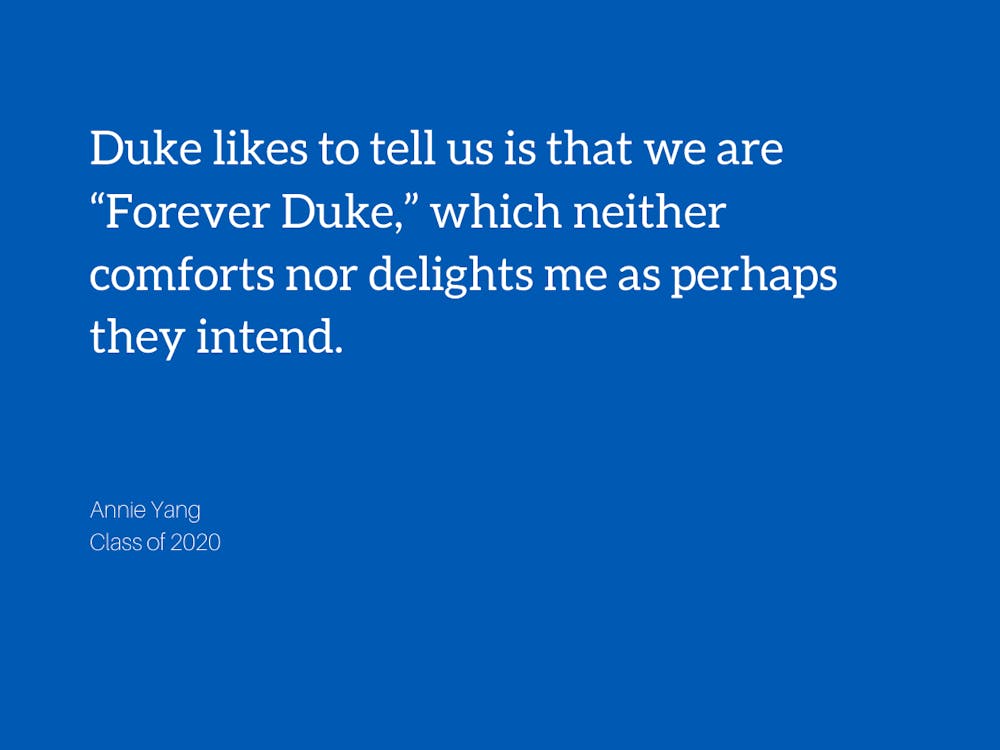Like every senior, I’ve been receiving emails for the last few months about the Senior Giving Challenge, reeling me in with donor-exclusive balls and Chapel climbs in exchange for a donation to Duke. Last week, I also attended a “senior leaders dinner” with students, administrators, and other University officials in a two-hour exercise to encourage a euphemistic interest in philanthropy and alumni engagement. I made up my mind years ago never to donate to Duke, but I did get a free dinner out of this experience.
However, now that graduation looms in the not-so-far-away distance, I have been mulling over what it means to be a Duke alumna, to be indelibly marked by the fact of having attended Duke University. Duke likes to tell us is that we are “Forever Duke,” which neither comforts nor delights me as perhaps they intend. Personally, the slogan registers less on the level of “you’re always part of the family” and more like “don’t forget, you’re here forever.”
Before the peanut gallery in the comments call me ungrateful, I recognize that Duke gave me a formative education and the financial aid that made my experience possible. I will also be transparent that one of the biggest reasons I came to Duke was because of its ranking. Study hard in high school, go to a good college, get a good job. The purpose of a “world-class education” is hardly intellectual curiosity and exploration but rather reinforcing the status quo and grooming the children of the elite to retain socioeconomic power.
For the last four years, I’ve been thinking about how the university functions and what it means to be implicated in it, to want to come here in the naked pursuit of power. How did the university obtain that power in the first place? Why does it hold the keys to social advancement?
Duke University is a private, predominantly white institution with a largely Eurocentric curriculum, built on the stolen land of the Shakori and Catawba peoples and built by the extracted labor of Black and Brown people. It is the historical and ongoing accumulation of land, labor, and bodies that makes Duke possible, that provide the foundation for the power that Duke invites a select few to participate in. There is the reason that Duke can never quite shake off its moniker of “the plantation.”
In my short time here, my peers and I have borne witness to the history of Duke that hurts. From killing the light rail to the staggering 48% sexual assault rate of undergraduate women to the gentrification of Durham to threatening to revoke health insurance coverage to union busting to the seemingly endless cycle of hate and bias crimes and on and on and on. The Class of 2020 has catalogued the myriad of ways that Duke has ignored, exhausted, drained and hurt its most vulnerable.
None of this is accidental. All of this points to systemic issues of not an institution that is broken but one that is functioning smoothly by design to protect its own interests and extract as much as possible from students, faculty, staff, workers, and the Durham community. For Duke to maintain its power, to stand as a pillar of American—and global—higher education, these mundane and profound violences are necessary and will continue long after we graduate.
What, then, is the point of donating to Duke? In the crudest terms, it’s to help guarantee Duke’s survival. Alumni-to-be are (literally) invested in Duke’s survival because its survival is partly, perversely our own. The potential loss of the pedigree of a Duke degree—the same prestige that is built on harm and exploitation—is the loss of the symbolic capital and material benefits of a Duke education. Without Duke, who are we as Duke students and alumni?
I return to “Forever Duke” to ask myself, why should Duke be “forever?” Why should I participate in guaranteeing the futurity of settler-colonial institution? Why does Duke deserve to survive? Who or what must die for Duke to live?
Two years ago, People’s State of the University launched a campaign urging students to refuse to donate to Duke until they created a standardized hate and bias policy. (What happened to that anyway?) However, perhaps saying no to donating to Duke can be more than a temporary withholding of money until the institution “reforms” itself to be worth donating to.
To redress the harms that Duke perpetuates and to dismantle the structures that uphold Duke—and those that Duke upholds in turn—would be tantamount to abolishing Duke itself. A Duke that returns its land to the Eastern Band of the Cherokee Nation, Coharie, Lumbee, Haliwa-Saponi, Sappony, Meherrin, Occaneechi Band of the Saponi Nation and Waccamaw-Siouan peoples of North Carolina would be an unrecognizable Duke. A Duke that does not hoard its $8.6 billion of wealth would be an inconceivable Duke. A Duke that is controlled not by administrators and wealthy donors but by students and workers would be an impossible Duke. A Duke that operates in the genuine service of Durham would be an unimaginable Duke.
I do not hold my breath, waiting for the day that the Board of Trustees resolves to dissolve Duke, redistribute its wealth and return its land. I’m not invested in fighting for Duke to reform itself. I’m interested in fighting for a world where Dukes are impossible.
Until then, perhaps saying no to the senior gift can be a categorical refusal to fund the institution’s existence itself. Until then, I’ll keep my money.
Annie Yang is a Trinity senior. Her column, “planting seeds,” typically runs on alternate Mondays.
Get The Chronicle straight to your inbox
Signup for our weekly newsletter. Cancel at any time.

